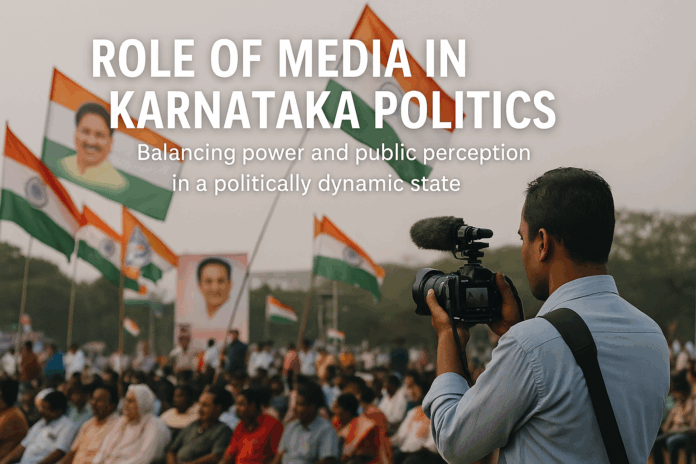🏛 Role of Media in Karnataka Politics
Balancing Power and Public Perception in a Politically Dynamic State
Karnataka has long been recognized as one of India’s most politically active and diverse states, often serving as a barometer for regional and national political trends. In such a charged environment, the media both legacy and emerging digital platforms play a powerful role in shaping political narratives, informing voters, and holding power to account.
From covering Assembly elections to live-debating budget allocations, from fact-checking political speeches to exposing corruption Karnataka’s media acts as both mirror and mediator in its democracy. However, challenges such as media ownership by political interests, lack of objectivity, and digital misinformation threaten the media’s role as a neutral watchdog.
📰 A Historical Relationship: Press and Politics
Karnataka’s political and journalistic landscapes have evolved hand in hand. During the freedom struggle, Kannada publications like Samyukta Karnataka and Tainadu carried nationalist messages and anti-colonial voices. Post-independence, regional newspapers such as Prajavani, Udayavani, and Vijaya Karnataka became influential platforms for public debate.
As Karnataka transitioned into a multi-party democracy with strong regional parties and complex caste and linguistic coalitions, media became critical in:
- Reporting policy outcomes
- Covering constituency development
- Highlighting electoral promises vs. performance
- Exposing financial and ethical improprieties in governance
📺 Modern Political Coverage: Rise of TV and Digital
With the liberalization of media in the 1990s and the digital explosion post-2010, political journalism in Karnataka entered a new era. Today, citizens consume politics through:
- 24×7 Kannada news channels like TV9 Kannada, Public TV, and Suvarna News
- Social media platforms where politicians livestream speeches and debates
- YouTube-based political commentary channels and citizen journalism pages
The visual and viral nature of digital media has dramatically reshaped campaign strategies and public engagement.
Watchdog vs. Mouthpiece: Navigating Bias and Ownership
A pressing issue in Karnataka’s political media is the growing ownership of media houses by political entities or their affiliates. This leads to:
- Favorable coverage for ruling parties or opposition, depending on ownership
- Selective reporting that ignores uncomfortable facts
- Undermining of media’s credibility and objectivity
Moreover, paid news during elections, sensationalism for TRP, and lack of critical questioning in political interviews raise concerns about editorial independence.
However, there are still credible and courageous journalists who provide in-depth, unbiased coverage, especially during:
- Assembly elections
- Panchayat and BBMP polls
- Cabinet reshuffles and policy announcements
🗳 Media’s Influence on Voters and Electoral Democracy
Karnataka has one of India’s highest literacy rates and an active civil society. The media here significantly influences:
- Voter education through manifesto comparisons, exit polls, and debates
- Issue-based politics (agriculture, language, education) through panel discussions and investigative stories
- Mobilization of youth and urban voters via social media content in Kannada and English
Journalism here has contributed to exposing dynastic politics, corruption in local governance, and lapses in public services, strengthening participatory democracy.
⚠ Challenges for Political Journalists
Political journalists in Karnataka today face:
- Online trolling, especially on caste or religion-based coverage
- Defamation cases filed by political entities to stifle critique
- Threats or pressure to not publish certain reports
- Lack of press freedom during elections and emergency law situations
BMA’s Role: Defending Ethical Political Journalism
The Bharat Media Association (BMA) is working actively to:
- Train journalists in ethical political reporting and fact-checking
- Provide legal and digital security support to reporters facing political backlash
- Encourage independent political commentary in regional languages, especially Kannada
- Launch fellowships to track MLA performance and local governance promises
- Promote media literacy among the public to understand political bias and misinformation
📌 The Way Forward: A Stronger, Fairer Political Press
As Karnataka continues to be a hotbed of political experimentation—from coalition governments to civic protests its media must rise to the challenge of being accountable, fair, and people-centric. With support from institutions like BMA and a push toward media transparency and press freedom, Karnataka can serve as a model for robust political journalism in India.









